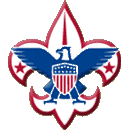| MERIT BADGES |
|
|
|
|
| Note: Eagle Required are in Italics |
"A"
American
Business
American Culture
American Heritage
American Labor
Animal Science
Archaeology
Archery
Architecture
Art
Astronomy
Athletics
Atomic Energy
Auto Mechanics
Aviation
"B"
Backpacking
Basketry
Bird Study
Bugling
"C"
Camping
Canoeing
Chemistry
Cinematography
Citizenship
Community*
Citizenship Nation*
Citizenship World*
Climbing
Coin Collecting
Collections
Communications*
Computers
Cooking
Crime Prevention
Cycling*
"D"
Dentistry
Disability Awareness
Dog Care
Drafting
"E"
Electricity
Electronics
Emergency
Preparedness**
Energy
Engineering
Entrepreneurship
Environmental
Science*
"F"
Family Life*
Farm Mechanics
Fingerprinting
Fire Safety
First Aid*
Fish & Wildlife Mgmt.
Fishing
Fly Fishing
Forestry
"G"
Gardening
Genealogy
Geology
Golf
Graphic Arts
"H"
Hiking
Home Repairs
Horsemanship
"I"
Indian Lore
Insect Studies
"J"
Journalism
"K"
"L"
Landscape Architecture
Law
Leatherwork
Lifesaving**
"M"
Mammal Study
Medicine
Metalwork
Model Design & Building
Motorboating
Music
"N"
Nature
"O"
Oceanography
Orienteering
"P"
Painting
Personal Fitness**
Personal Management*
Pets
Photography
Pioneering
Plant Science
Plumbing
Pottery
Public Health
Public Speaking
Pulp and Paper
"Q"
"R"
Radio
Railroading
Reading
Reptile & Amphibian Study
Rifle Shooting
Rowing
"S"
Safety
Salesmanship
Scholarship
Sculpture
Shotgun Shooting
Skating
Skiing
Small Boat Sailing
Soil & Water
Conservation
Space Exploration
Sports**
Stamp Collecting
Surveying
Swimming**
"T"
Textile
Theatre
Traffic Safety
Truck Transportation
"U"
"V"
Veterinary Medicine
"W"
Water Skiing
Weather
Whitewater
Wilderness Survival
Wood Carving
Woodwork
"X"
"Y"
"Z"
 Cooking CookingRequirements 2002 |
-
Do the following:
-
Review with your counselor the injuries that might arise from cooking, including burns and scalds, and the proper treatment.
-
Describe how meat, fish, chicken, eggs, dairy products, and fresh vegetables should be stored, transported, and properly prepared for cooking.
-
Describe the following food-related illnesses and tell what you can do to help prevent each from happening:
-
Salmonella enteritis
-
Staphylococcal enteritis
-
E. coli (Escherichia coli) enteritis
-
Botulism
-
Trichinosis
-
Hepatitis
-
-
-
Do the following:
-
Illustrate for your counselor the food pyramid. Label the pyramid, including:
-
The food groups
-
Milk, yogurt, and cheese group
-
Vegetable group
-
Meats, poultry, fish, dry beans, eggs, and nuts group
-
Fruit group
-
Bread, cereal, rice, and pasta group
-
-
The item on the pyramid that is not considered part of a food group and tell why its use is discouraged
-
The number of servings recommended per day from each group
-
-
Give your counselor examples from each food group.
-
Describe for your counselor the measurements of servings for each food group.
-
Describe to your counselor food preparation techniques that result in more healthful and nutritious meals.
-
-
Plan a menu for two straight days (six meals) of camping. Include the following:
-
A camp dinner with soup; meat, fish, poultry, or an appropriate substitute; two fresh vegetables; drink; and dessert. All are to be properly prepared. When preparing your menu, follow the nutritional guidelines set by the food pyramid.
-
A one-pot dinner. Use foods other than canned.
-
Using the menu planned for requirement 3, make a food list showing cost and amount needed to feed three or more boys.
-
List the utensils needed to cook and serve these meals.
-
-
Using the menu planned for requirement 3, do the following and discuss the process with your merit badge counselor:
-
Prepare and server for yourself and two others, the two dinners, one lunch, and one breakfast. Time your cooking so that each course will be ready to serve at the proper time.
-
The meals for this requirement may be prepared for different trips. They need not be prepared consecutively. Scouts working on this badge at summer camp should plan around food they can get at the camp commissary.
-
-
For meals prepared in requirement 4a for which a fire is needed, use a lightweight stove or build a low-impact fire. Include support for your cooking utensils from rocks, logs, or like material. The same fireplace may be used for more than one meal. Use a backpacking stove to cook at least one meal. (Where local regulations do not allow you to do this, the counselor may change the requirement to meet the law.)
-
For each meal prepared in requirement 4a, use safe food-handling practices. Dispose of garbage, cans, foil, paper, and other rubbish by packing them out and depositing them in a proper container. After each meal, clean up the site thoroughly.
-
-
Plan a menu for one day (three meals) or for four meals over a two-day period of trail hiking or backpacking. Include the following:
-
A breakfast, lunch, and dinner for a trail or backpacking trip where light weight is important. You should be able to store all foods used for several days without refrigeration. When preparing your menu, follow the nutritional guidelines set by the food pyramid.
-
The meals for this requirement may be prepared for different trips. They need not be prepared consecutively. Scouts working on this badge at summer camp should plan around food they can get at the camp commissary.
-
-
Using the menu planned for requirement 5, make a food list showing cost and amount needed to feed three or more boys.
-
List the utensils needed to cook and serve these meals.
-
Figure the weight of the foods in requirement 4a.
-
-
Using the menu planned for requirement 5a, do the following:
-
Prepare and serve for yourself and two others, the trail breakfast and dinner. Time your cooking so that each course will be ready to serve at the proper time.
-
The meals for this requirement may be prepared for different trips. They need not be prepared consecutively. Scouts working on this badge at summer camp should plan around food they can get at the camp commissary.
-
-
Use an approved trail stove (with proper supervision) or charcoal to prepare your meals.
-
For each meal prepared in requirement 6a, use safe food-handling practices. Dispose of garbage, cans, foil, paper, and other rubbish by packing them out and depositing them in a proper container. After each meal, clean up the site thoroughly.
-
-
Plan a menu for three full days of meals (breakfast, lunch, and dinner) to be cooked at home.
-
When preparing your menu, follow the nutritional guidelines set by the food pyramid. All meals are to be cooked or properly prepared.
-
Using the menu planned for requirement 7, make a food list, showing cost and amount needed to feed yourself and at least one adult (parent, family member, guardian, or other responsible adult).
-
Tell what utensils were needed to cook and serve these meals.
-
Prepare and serve a breakfast, lunch, and dinner from the menu you planned for requirement 7. Time your cooking to have each course ready to serve at the proper time. Have an adult verify the preparation of the meal to your counselor.
-
-
Do the following:
-
Find out what opportunities are available for a career in food service management. Find out what high school courses might help you prepare for a career in cooking, and about special training you might need and where to obtain such training. Discuss what you learned with your counselor.
-
Visit a professional cook, chef, food service manager, or Registered Dietician and learn what this professional's duties are. Discuss the person's education and training, techniques, and means used in professional food preparation, and local health regulations and licensing requirements that must be followed. Report to your counselor your findings.
-
|
||||||
Last Update May 15, 2023

.jpg)
